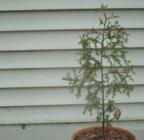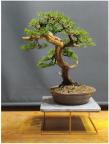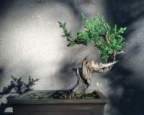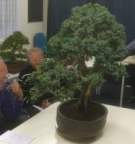Wiring Chalenge
- Bilal
-
Offline Topic Author
- New Member
-

- Posts: 6
- Thanks received: 0
I wired a tree today (June 1), as i was positioning the branches I heard some cracking, some more severe than other...I used raffia on the branches, I wrapped it very tightly.
How can I expect the tree to respond to this?
Thank you.
Please Log in or Create an account to join the conversation.
- Samantha
-
 Offline
Offline
- Platinum Member
-

- Posts: 695
- Thanks received: 151
Bilal wrote:
How can I expect the tree to respond to this?
Thank you.
Like it won't respond, one way or the other. Just wait and see ... That's what it's all about ...
What are you calling a tree?
Please Log in or Create an account to join the conversation.
- leatherback
-
 Offline
Offline
- Platinum Member
-

- Posts: 8645
- Thanks received: 3665
If you did a good job of raffiaing the plant, it will most likely survive the ordeal. But without knowing the species, and not having been there.. What is some cracking for one, is removing a branch for others.
Please Log in or Create an account to join the conversation.
- Bilal
-
Offline Topic Author
- New Member
-

- Posts: 6
- Thanks received: 0
@ leatherback - for the most part it was fine cracking, however I am sure I heard a bigger one.
I guess like Samantha said, I will have to wait it out.
@ leatherback - I don't understood how Raffia works, how does it help if the cambium layer is being damaged? It obviously work, I am curious to know how?
Please Log in or Create an account to join the conversation.
- Bilal
-
Offline Topic Author
- New Member
-

- Posts: 6
- Thanks received: 0
This image is hidden for guests.
Please log in or register to see it.
Please Log in or Create an account to join the conversation.
- Bilal
-
Offline Topic Author
- New Member
-

- Posts: 6
- Thanks received: 0
Please log in or register to see it.
Please Log in or Create an account to join the conversation.
- leatherback
-
 Offline
Offline
- Platinum Member
-

- Posts: 8645
- Thanks received: 3665
- The wet raffia makes the bark wet, and thus helps the bark be more pliable
- By pulling it very tight, it helps prevent the wood of breaking out through the bark. As such, the overall integrety of the branch is maintained
- It shields the bark intially from drying out too quicly and in this way supports the cambium in repairing itself.
The cambium is effectively a single cell thick layer of dividing cells with on either side maturing cells. It regrows quicly f the damage is slight.
Please Log in or Create an account to join the conversation.
- brkirkland22
-
 Offline
Offline
- Platinum Member
-

- Posts: 320
- Thanks received: 128
I know I'm not leatherback, but may help here with some tree info and tips.Bilal wrote: I don't understood how Raffia works, how does it help if the cambium layer is being damaged? It obviously work, I am curious to know how?
Cambium layer brings nutrients from leaves to the roots. The xylem (sapwood) brings it from roots to leaves. The cambium layer gets damaged quite a bit. In a tree's life, there will be significantly more damage to the tree above ground, than below. Wind, weather & wild will damage the cambium all day every day - it takes a beating. The inner sapwood (nutrients from roots) will keep feeding the top to facilitate healing. Cambium heals really well (think of a callus over a big cut); Roots and sapwood hold a great deal in reserve (think of dormancy) which allows them to survive a time with less energy fed from the cambium (leaves).
Now, in reverse, if the sapwood is damaged (breaks, cuts, beetle larvae, disease) the tree is at great risk - you're talking about it's main storage of nutrients being compromised. If these parts aren't given time to heal, or damage is to great to recover from, the tree is die back, or die completely.
If there are damaged cambium areas along your branch, they should heal up with minimal scaring as long as you have the raffia on. It will minimize the distance between damaged areas, allowing it to callus (unless it happened around the entire diameter with great distance). Raffia also helps with preventing the sapwood from too much damage in the same manner, and sapwood is very fibrous - it will give.
A way to prevent the large *snaps* or damage in the future, is to bend some, give it time to stretch/flex, bend some more a little while later (a few hours may be enough), and repeat. It also helps to let the plant dry out some. Think of celery that has been left without water for a time - it's flimsy in your hand. Stick it back in water, & it becomes rigid again. The vascular system has filled & strengthened.
... Just don't bone-dry it completely though, or you waste it all.
Please Log in or Create an account to join the conversation.
- leatherback
-
 Offline
Offline
- Platinum Member
-

- Posts: 8645
- Thanks received: 3665
The bark is the nutrient-to-root connection. Cambium is the nly layer of multiplying cellls in a branch, between sapwood and bark
Please Log in or Create an account to join the conversation.
- Auk
-
 Offline
Offline
- Platinum Member
-

- Posts: 6097
- Thanks received: 1791
brkirkland22 wrote: Cambium layer brings nutrients from leaves to the roots.
Nope. That's Phloem, which is on the outside. Therefore, when airlayering, you can cut through the cambium layer. There still will be transport from leaves down to where you cut it, and transport up through the xylem.
The xylem (sapwood) brings it from roots to leaves.
Yep.
Please Log in or Create an account to join the conversation.
